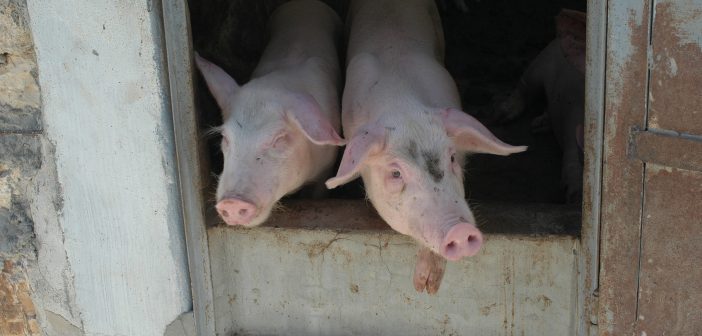(Featured image: pigs confined in an intensive farm in the West Bank. Courtesy Kim Bartlett – Animal People, Inc.)
There is insufficient evidence to support the use of homeopathy in farm animals as a way to prevent or treat infectious diseases, reveal findings from a comprehensive review published online in Veterinary Record.
While some clinical trials have shown effectiveness, the authors of the review question the reliability of the evidence, because all studies have a range of limitations.
All clinical trials were conducted under very specific conditions, for example, and none were repeated under comparable conditions. Therefore, the authors say the findings cannot be be used to recommend homeopathy.
Homeopathy is widely used in livestock, especially to replace or reduce the use of antibiotics in the treatment of infectious diseases, although its use is often seen as controversial. For organic agriculture, homeopathy is even promoted.
In this comprehensive review, Dr Caroline Doehring and Professor Albert Sundrum from the University of Kassel, Germany, assessed peer-reviewed studies on the efficacy of homeopathy in cattle, pigs and poultry published between 1981 and 2014.
They analysed 48 publications on homeopathic remedies, which has been suggested to replace or prevent the use of antibiotics or promote growth in food producing animals. This included 52 clinical trials, 34 with cattle, 12 with pigs and six with poultry.
Overall, 28 trials were in favour of homeopathy, 26 showed significantly higher efficacy in comparison to a control group, while 22 demonstrated no effect.
Only 10 trials provided information on cure rates for the treatments. These varied to a high degree, while the remedy used did not seem to make a big difference.
Trials on pigs were frequently efficacious, while studies with cattle or poultry had a similar distribution of efficacious and non-efficacious treatment.
Double-blind randomised controlled trials reported efficacy of the homeopathic treatment almost as often as they reported lack of it.
Meanwhile, single-blind and non-blind randomised controlled trials, and observational trials were more likely to present evidence of efficacy, suggesting that positive outcomes may be due to bias.
Other study limitations, such as potential conflict of interests, low sample size, risk for selective reporting and bias, were found in the majority of trials.
“A considerable number of studies demonstrated a significantly higher efficacy for homeopathic remedies than for a control group,” explain the authors, “therefore, the potential medical efficacy of homeopathy under certain conditions cannot be ruled out.”
However, they caution that “all studies included were conducted under very specific conditions, but no trial was repeated in a comparable manner. A certain remedy which proved efficacious in a scientific trial may not be effective under farm conditions.
“The current evidence of studies providing evidence in favour of homeopathy lacks reproducibility and therefore cannot claim to have sufficient prognostic validity.”
They explain that evidence of efficacy can only be proven by reproducing results through randomised controlled trials, the gold standard for evaluating the efficacy of interventions, and in various farm management conditions.
They stress the importance of applying the most effective treatment or remedy to prevent unnecessary suffering of the diseased animal, and say that due to the unknown level of effectiveness of on-farm homeopathy, this can only be established through the appropriate control and monitoring of treatment success on farms.
__
Veterinary Record, published weekly since 1888, is the official journal of the British Veterinary Association (BVA). It is published on behalf of the BVA by BMJ. http://veterinaryrecord.bmj.





